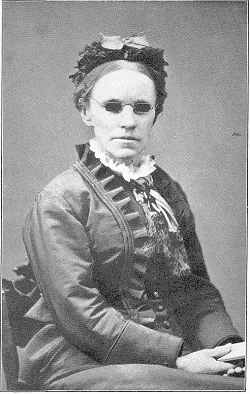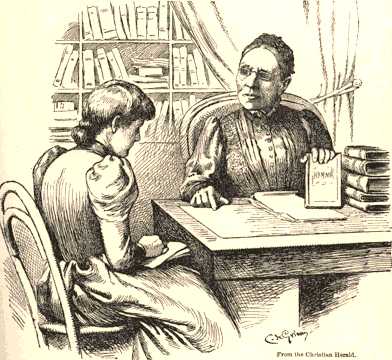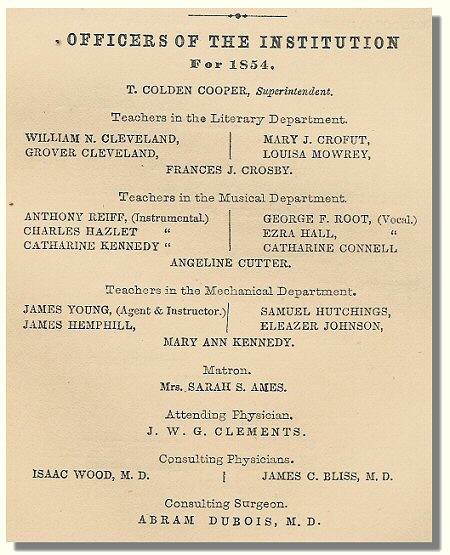School Life
 What can a blind girl do for self-support in a world, which seems so crowded with toilers in every department? Thoughtful teachers are studying the question for their pupils. Hundreds of girls, in school and at home, are asking it. Circumstances and environment often decide this point for the eager questioner, and, when such decision chances to be in harmony with the natural aptitude of the person, a surprising success may result; for in choice of occupation among the blind it is even more necessary than among the sighted to consider the characteristic tastes and ability of the individual. Every attainment is a service. Every successful woman is an aid to her sisters, encouraging them to renewed energy in their struggle to find the places which God holds in his keeping for those who strive worthily.
What can a blind girl do for self-support in a world, which seems so crowded with toilers in every department? Thoughtful teachers are studying the question for their pupils. Hundreds of girls, in school and at home, are asking it. Circumstances and environment often decide this point for the eager questioner, and, when such decision chances to be in harmony with the natural aptitude of the person, a surprising success may result; for in choice of occupation among the blind it is even more necessary than among the sighted to consider the characteristic tastes and ability of the individual. Every attainment is a service. Every successful woman is an aid to her sisters, encouraging them to renewed energy in their struggle to find the places which God holds in his keeping for those who strive worthily.Among such we find Fanny Crosby, of New York, the hymnwriter, whose sacred songs are sung wherever the English language is spoken. For twenty eight years she has been employed by the firm of Bigelow & Main, to whom she supplies a certain number of hymns weekly; and she is so prolific a writer that during this engagement she is said to have composed nearly three thousand hymns.
Frances Jane Crosby was born March 24, too, in Putnam County, New York. While still a baby, scarcely more than six months old, she lost her sight through some maltreatment; but the misfortune did not check the joyousness of her nature or restrain her activity. The gladness of heart, the resolute spirit, and the practical mind of the future woman are clearly foreshadowed in the following rhymes written when she was only eight years old:
Oh, what a happy soul I am,
Although I cannot see!
I am resolved that in this world
Contented I will be.
How many blessings I enjoy
That other people don't I
To weep and sigh because I'm blind,
I cannot and I won't!
Although I cannot see!
I am resolved that in this world
Contented I will be.
How many blessings I enjoy
That other people don't I
To weep and sigh because I'm blind,
I cannot and I won't!
Fanny was already eleven before the first school for the blind was opened in the United States, and it was in the early years of the Institution in New York City that she received her education. Very pleasant are her memories of those days, and of Dr. Russ, the first superintendent, whose very name brings a glow of delight to her face and to her lips the enthusiastic tribute, "I love him dearly," for, though his earthly life is of the past, her grateful affection is of the present. The years which she spent here made a deep impression upon her life. Her love of literature and of music was apparent in childhood, and developed rapidly under instruction. She acquired an excellent education,
and, after completing her studies, was employed for eleven years as a teacher of grammar and rhetoric, ancient and modern history.
She was a facile writer Her thoughts seemed almost involuntarily to clothe themselves in rhyme. It was while she was teaching in the New York Institution that her first volume, entitled "The Blind Girl, and Other Poems," was published, in 1844 Monterey, and Other Poems," followed a few years later; and this was succeeded by a third volume, '`A Wreath of Columbia's Flowers." All these, except a few songs, are now almost forgotten. Her real work commenced in 1864 when, at the request of William B. Bradbury a composer of sacred music, she began to write hymns for the Sabbath school; and in this she has evidently found her vocation.
FANNY CROSBY IN HER STUDY.
Fanny Crosby in her study.
Her love of music, her ability to sing and to play the guitar and the piano, her perfect sense of rhythm, and her gift for harmonizing words and music, combined to give a peculiar fitness for this work. She often revises hymns written by others, to adapt them to music. She composes Christmas cantatas, hymns, and recitations for Easter, and for any special occasions. She is the author of the words of some of our popular songs which are generally accredited to George F. Root, the musical composer. Among these are " Hazel Dell," " Rosalie, the Prairie Flower," and ``There's Music in the Air." Sometimes she writes both words and music. She has been a close student of the Bible and a reader of standard authors; and she considers her wonderful memory as her greatest blessing. She memorizes her hymns before beginning to dictate to her amanuensis, and sometimes four are prepared before one is transferred to paper. "Keep thou my Way, O Lord!" "The Bright Forever," 'Rescue the Perishing," and "Pass me not, O Gentle Saviour are among the well known hymns of her composition; but perhaps the most widely known and popular is, " Safe in the Arms of Jesus," which is also a favorite with its author.
Many of her hymns have stirred the hearts of listeners and awakened longings for a better life; and many a touching story of their influence is related. Her own peaceful and confident spirit breathes through her lines, and gives them power over the hearts of others.
Her industry is a marked characteristic. She is never idle. Speaking of occupations, she one day remarked that, if she could not write, she believed she would go into restaurant and wash dishes; for she was sure she could do that well. Her hands are as active as her mind; and counterpanes and many other knitted articles are the product of her busy fingers. Her home is with a friend who has been her amanuensis for fourteen years.
Miss Crosby is a slender woman, somewhat below the average stature, with an animated and happy face, a pleasant voice, which has also a resolute sound, a trim figure, which in its neatness reminds one of the presiding genius of a New England household, and an atmosphere about her as of one whose life is occupied with the "Father's business." Her thin, worn frame shows signs of age, but not of infirmity; and now, at the age of nearly seventy two years, this energetic woman, whose cheerful spirit sheds a sweet air of peace and happiness around her, pursues her career with undiminished vigor.
---
List of 1854 NYI Yearbook listing Cleveland as a Teacher in the Literary DepartmentWhen he was a young man, Grover Cleveland came to the New York Institute as an instructor and became life long friends with a fellow instructor named Fanny Crosby. In a book she wrote in 1903, she writes about this young man that would some day be elected president of the United States.
and, after completing her studies, was employed for eleven years as a teacher of grammar and rhetoric, ancient and modern history.
She was a facile writer Her thoughts seemed almost involuntarily to clothe themselves in rhyme. It was while she was teaching in the New York Institution that her first volume, entitled "The Blind Girl, and Other Poems," was published, in 1844 Monterey, and Other Poems," followed a few years later; and this was succeeded by a third volume, '`A Wreath of Columbia's Flowers." All these, except a few songs, are now almost forgotten. Her real work commenced in 1864 when, at the request of William B. Bradbury a composer of sacred music, she began to write hymns for the Sabbath school; and in this she has evidently found her vocation.
FANNY CROSBY IN HER STUDY.

Fanny Crosby in her study.
Her love of music, her ability to sing and to play the guitar and the piano, her perfect sense of rhythm, and her gift for harmonizing words and music, combined to give a peculiar fitness for this work. She often revises hymns written by others, to adapt them to music. She composes Christmas cantatas, hymns, and recitations for Easter, and for any special occasions. She is the author of the words of some of our popular songs which are generally accredited to George F. Root, the musical composer. Among these are " Hazel Dell," " Rosalie, the Prairie Flower," and ``There's Music in the Air." Sometimes she writes both words and music. She has been a close student of the Bible and a reader of standard authors; and she considers her wonderful memory as her greatest blessing. She memorizes her hymns before beginning to dictate to her amanuensis, and sometimes four are prepared before one is transferred to paper. "Keep thou my Way, O Lord!" "The Bright Forever," 'Rescue the Perishing," and "Pass me not, O Gentle Saviour are among the well known hymns of her composition; but perhaps the most widely known and popular is, " Safe in the Arms of Jesus," which is also a favorite with its author.
Many of her hymns have stirred the hearts of listeners and awakened longings for a better life; and many a touching story of their influence is related. Her own peaceful and confident spirit breathes through her lines, and gives them power over the hearts of others.
Her industry is a marked characteristic. She is never idle. Speaking of occupations, she one day remarked that, if she could not write, she believed she would go into restaurant and wash dishes; for she was sure she could do that well. Her hands are as active as her mind; and counterpanes and many other knitted articles are the product of her busy fingers. Her home is with a friend who has been her amanuensis for fourteen years.
Miss Crosby is a slender woman, somewhat below the average stature, with an animated and happy face, a pleasant voice, which has also a resolute sound, a trim figure, which in its neatness reminds one of the presiding genius of a New England household, and an atmosphere about her as of one whose life is occupied with the "Father's business." Her thin, worn frame shows signs of age, but not of infirmity; and now, at the age of nearly seventy two years, this energetic woman, whose cheerful spirit sheds a sweet air of peace and happiness around her, pursues her career with undiminished vigor.
---

List of 1854 NYI Yearbook listing Cleveland as a Teacher in the Literary DepartmentWhen he was a young man, Grover Cleveland came to the New York Institute as an instructor and became life long friends with a fellow instructor named Fanny Crosby. In a book she wrote in 1903, she writes about this young man that would some day be elected president of the United States.
